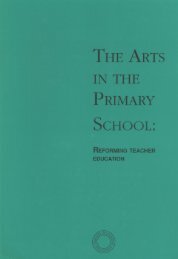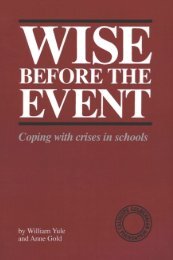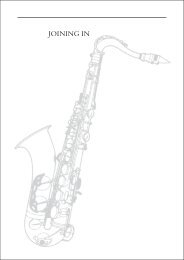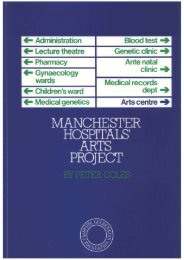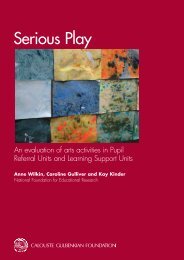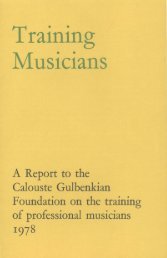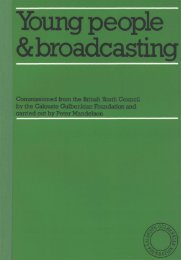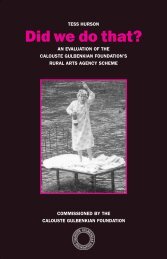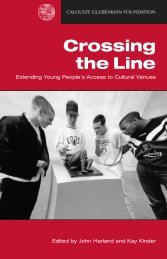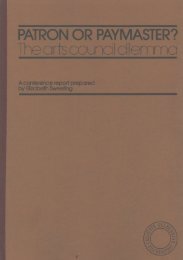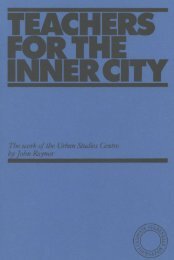The Arts in Schools - Calouste Gulbenkian Foundation
The Arts in Schools - Calouste Gulbenkian Foundation
The Arts in Schools - Calouste Gulbenkian Foundation
- No tags were found...
Create successful ePaper yourself
Turn your PDF publications into a flip-book with our unique Google optimized e-Paper software.
eyond the immediate, needs of the economy. It was fundamentally to do withideology, with conflicts of values <strong>in</strong> education, and ultimately with the questionof who should control the curriculum. <strong>The</strong> Great Debate brought <strong>in</strong>to the openthe conflict between 'progressive' and 'traditional' styles of education whichhad been gather<strong>in</strong>g force from the late 1960s. In do<strong>in</strong>g so it drew <strong>in</strong> deeplycontested questions about standards, about discipl<strong>in</strong>e, values and politics <strong>in</strong>education.In the terms of the Great Debate the arts were at risk from two misconceptions.First, to those who argued that the ma<strong>in</strong> role of education is to prepare youngpeople for work, arts education evidently seemed unnecessary except for thoselook<strong>in</strong>g for arts jobs. Second, through the emphasis <strong>in</strong> some teach<strong>in</strong>g oncreativity, self-expression and personal development, the arts had becomeassociated with non-<strong>in</strong>tellectual activities, and therefore seemed to lie outsidethe priorities of those who argued for a return to 'traditional' academic values.<strong>The</strong> <strong>Arts</strong> <strong>in</strong> <strong>Schools</strong> report was written with four objectives. <strong>The</strong> first was toput the arts firmly <strong>in</strong>to the debate on the future of state education. Hardly anyof the many statements on the curriculum, which flowed from all quarters afterthe Rusk<strong>in</strong> speech, had mentioned the arts at all: none had dealt with them <strong>in</strong>detail. <strong>The</strong> second objective was to put the case for the arts as clearly as possibleto policy-makers at all levels. Much of the exist<strong>in</strong>g literature on arts educationhad been written for specialists of different sorts: none of it was addressedspecifically to the economic and ideological issues raised <strong>in</strong> the GreatDebate. Our third objective was to identify the real problems—practical andotherwise—that faced the full development of the arts <strong>in</strong> schools; the fourthwas to identify ways ahead.<strong>The</strong> report attracted an immediate and positive response from all sectors ofeducation and its <strong>in</strong>fluence cont<strong>in</strong>ues to grow. Head teachers, LEA officers,professional associations and politicians of all parties strongly welcomed <strong>The</strong><strong>Arts</strong> <strong>in</strong> <strong>Schools</strong> as an essential counterbalance to much of the prevail<strong>in</strong>gargument <strong>in</strong> education. At the <strong>in</strong>itiative of Lord Beaumont the report wasdebated <strong>in</strong> the House of Lords on 5 April 1982 (Hansard, page 100). <strong>The</strong>debate drew an assurance from Lord Elton:'. . . lest there be any doubt . . . that the Government fully accept thecase that the arts are not merely a desirable but an essential componentof the education offered <strong>in</strong> schools. This means not only foster<strong>in</strong>g thetalents of the artistically gifted, important as that is, but provid<strong>in</strong>gopportunities for all pupils ... to participate <strong>in</strong> artistic activity and tolearn about the arts.'Comment<strong>in</strong>g that the school curriculum is 'first and foremost the responsibilityof local education authorities and schools' and that the government 'cannotand <strong>in</strong>deed should not dictate what they should do', Lord Elton believed thatthe report would be 'widely read and will <strong>in</strong>fluence th<strong>in</strong>k<strong>in</strong>g and it will do sodeservedly'. It was and, I th<strong>in</strong>k, it has.Many of the report's specific recommendations have been taken up. In theyear follow<strong>in</strong>g publication over forty local education authorities organisedmajor conferences or <strong>in</strong>-service events to publicise and consider the report,xii



